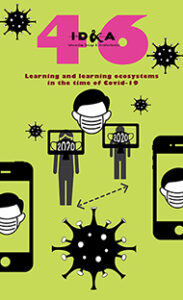(https://doi.org/10.55612/s-5002-046)


Kati Aus
works as a lecturer of educational psychology and a researcher in teacher education in Tallinn University. Her work there is mainly focused on educational psychology in teacher education. She is also active in Tallinn University of Technology as a consultant of university didactics. Her research interests cover topics of the psychology of learning, including study motivation, social-emotional aspects of learning and conceptual change processes.

John M. Carroll
is Distinguished Professor of Information Sciences and Technology and Director of the Center for Human-Computer Interaction at Pennsylvania State University. His research is in methods and theory in human-computer interaction, design of interactive information systems for collaborative learning and problem solving, and spontaneous innovations of people interacting with technology mediated problems and possibilities.Carroll has received the Rigo Award and the CHI Lifetime Achievement Award from ACM, the Silver Core Award from IFIP, and the Goldsmith Award from IEEE. He is a fellow of AAAS, ACM, IEEE, the Human Factors and Ergonomics Society, the Psychonomics Society, the Society for Technical Communication, and the Association for Psychological Science. In 2018, he received the Faculty Scholar Medal in Social and Behavioral Science from Penn State.

Kee-Man Chuah
is a senior lecturer at the Faculty of Language and Communication, majoring in educational technology, computational linguistics, learning sciences and instructional design. He is also active in developing various innovations in teaching and learning as well as assistive technology.

Jenna Conan Simpson
is a Ph.D. student in Learning Technologies at the University of North Texas and the Technology Integration Specialist at All Saints’ Episcopal School in Fort Worth, Texas. In addition to leading her school’s move to remote learning last year, providing professional development and managing all digital learning programs and student devices, she teaches computer science, artificial intelligence, and VR/AR elective courses. Before moving into this role, she was a 3rd through 5th grade classroom teacher. She has her master’s degree in Educational Technology from Texas A&M University. She is passionate about technology’s potential to transform classrooms to be more engaging and student-centered and to make teachers’ jobs easier.

Shahera Afroz Deena
is a graduate of Accounting in the School of Business Administration at East Delta University, Bangladesh. She has completed the last segment of her graduation during the pandemic of COVID 19 and experienced the transformation of education from traditional face-to-face to online learning. Thus, she felt the need for virtual education in that period, and such a realization motivated her to contribute to research in the relevant field.

Eleonora Faggiano
holds a PhD in Computer Science discussing a thesis on the use of technologies in mathematics education and is currently Assistant Professor in Mathematics Education at the University of Bari Aldo Moro. Her research interests concern the integration of digital and non-digital resources in the teaching practices and in the mathematics teacher professional development.

Carlo Giovannella
Graduated in Physics, he worked long time in solid state physics as an expert of complex systems. Nowadays can be considered a ‘Designer for the experience’: expert in the technology-enhanced learning, interaction design, computer-mediated communication, design and management of processes, process and product innovation, ecosystems monitoring and benchmarking. Since 2015 is the President of ASLERD (Association for Smart Learning Ecosystems and Regional Development). It has been the Scientific Director of the Creative Industries Area at the Consorzio Roma Ricerche from 2013 till 2016.
He is member of the Dept. of History, Cultural Heritage, Education & Society of the University of Rome Tor Vergata, where he is chair of the ISIM_garage (Interfaces and Multimodal Interactive Systems), a research lab devoted to design and development of TEL-environments, tools and methods for education, interaction design, and more.

Aminul Islam
is currently working as a Professor in the School of Business Innovation and Technopreneurship at Universiti Malaysia Perlis. He received his bachelor’s degree from the International Islamic University Malaysia, MBA and Doctor of Philosophy from Universiti Sains Malaysia. He also completed an advanced diploma in teaching in higher education from the Nottingham Trent University. He is a member of Asian Academy of Management, Malaysian Institute of Management, and an associate member of Malaysian Finance Association. He has authored and co-authored five books, two book chapters, and about 200 research papers. He has so far produced 20 PhD graduates. His recent research has spanned issues related to Entrepreneurship, IPO underpricing, Earning Management, Block chain, Blue Economy, Islamic banking and Sukuk.

Mohammad Rokibul Kabir
He is a Post-Doctoral Research Fellow at Universiti Malaysia Perlis (UNiMAP) since 1st June 2020. He was awarded a Ph.D. in 2017 by ‘University of Chittagong.’ Before that, he completed his M.Phil, MBA, and BBA from the same university. He has also passed LLB from the University of Information Technology and Sciences. He has been serving the School of Business Administration of East Delta University as a faculty for quite a long time. He has more than forty publications in different journals, and he is highly interested in accounting, finance, and business technology related research. Dr. Kabir is currently leading the School of Business Administration of East Delta University, Bangladesh, as the Associate Dean. He is a lawyer and a member of the Chittagong Bar Association, Bangladesh.

Na Li
is a second-year PhD student in Learning design and technology at Penn State University, and she works as an instructional designer at teaching and learning technology center at university park. Na received her master degree in learning and design from Vanderbilt University. She is interested in using technology to upgrade students’ learning experience. In the past two years, she had research experience in using intelligent tutoring system to improve middle school students’ algebra, and using block-based programming to improve STEM education and computational thinking. Currently, she is interested in exploring the university teaching and learning transition experience after the covid-19 pandemic happened, and how to harness education technologies to promote online teaching and learning.

Andrea Manciaracina
Communication Designer graduated from Politecnico di Milano. He deals with the relationship between communication design and technological devices for learning, and the impact of these two elements within the design of innovative learning environments. He is a research fellow and doctoral student at the Department of Design of the Politecnico di Milano, where he also collaborates within the Politecnico’s Design System (School of Design, Department of Design and Poli.design).

Federica Mennuni
is a PhD student in Mathematics at the University of Bari Aldo Moro. She received her MSc in Mathematics analysing and discussing high school students’ difficulties on the extension of number systems. She extends her interests toward the teaching and learning of calculus, especially at university level, also including the role of digital resources in this respect.

Fitri Suraya Mohamad
teaches at the Faculty of Cognitive Sciences and Human Development, Universiti Malaysia Sarawak (UNIMAS), Malaysia. In over twenty years in UNIMAS, she has taught and supervised students on topics related to teaching and learning, particularly in the use of technology to support and enhance learning. Fitri is currently involved in teaching and training Masters and PhD students and local Sarawak teachers to use Gamification as an indigenous and creative approach to engage young school children to learn and focus in class, especially those in remote and rural locations in Borneo.

Marcello Passarelli
is a PhD in Psychology, Anthropology, and Cognitive Sciences working in ITD-CNR as a research fellow since 2017. His research interests include implicit measures, statistical modeling, and social cognition, with a strong quantitative focus. During his stay in ITD-CNR, he worked on the H2020 Gaming Horizons project, focusing on the social impact of video games and gamification, on the Erasmus+ CODUR project for quality assurance of e-learning institutions, and on the Erasmus+ ENhANCE project, which designed a European curriculum for family and community nurses.

Katrin Poom-Valickis
is a professor of Teacher Education at the School of Educational Sciences at Tallinn University. She has been a project leader and co-coordinator in several projects related to the development of Teacher Education and member of the expert group who prepared the implementation of the induction year for novice teachers in Estonia. The main research interest is primarily focused on the teacher’s professional development, more precisely how to support future teachers’ learning and development during their studies and first years of work.

Jenay Robert
is a research project manager at Penn State’s education technology center, Teaching and Learning with Technology. She collaborates with faculty, staff, and students across the Penn State system on projects that lie at the intersection of postsecondary education and technological innovation. Jenay’s primary research interests are learning spaces, student and instructor affect, and inclusive pedagogy.

Guillermo Romera Rodriguez
is a PHD Candidate enrolled in Penn State’s College of Information Sciences and Technology Informatics program. His primary research interest is the use of gamification techniques in the educational context. Most recently he gained interest on the impact that COVID19 is having on education.

Kirsti Rumma
is a Senior Lecturer in Business Mathematics, Statistics and Quantitative Methods, and Head of Studies at the Department of Economics and Finance at Tallinn University of Technology. Getting her PhD in Mathematics Education at University of Agder, Norway, she has worked as an analysist and researcher in mathematics and general education as well as a curriculum developer. Her main research interests are subject and general didactics, education, and sociology.

Alex Serpi
is a research project manager at Penn State’s Teaching and Learning with Technology (TLT). TLT works with faculty, staff, and students across the university to study and enhance education through technological innovation. Alex combines an expertise in quantitative data analysis from earning a doctoral degree in biology with graphics-based reporting to inform broad audiences on important trends in education and technology. Research interests include equitable access, digital privacy, and data-informed teaching practices.

Chun-Hua Tsai
is an assistant research professor of Information Sciences and Technology at Pennsylvania State University. His specialization is in human–computer interaction (HCI) and data science. Chun-Hua Tsai has extensive research experience in recommender systems, user intelligent interfaces, social computing, accessibility, and health informatics. He published numerous conference and journal papers in the HCI and AI community

Terje Väljataga
is a Senior Researcher in the Centre of Excellence in Educational Innovation at Tallinn University (Estonia). Terje has been involved in various educational research and development projects both local and international since 2004. Currently she coordinates Horizon2020 project SEIS – Scaling up educational innovation in schools. Her research interests focus on integrated learning designs, orchestration and teacher support in outdoor mobile learning settings as well as students’ transformative experiences and science capital.
